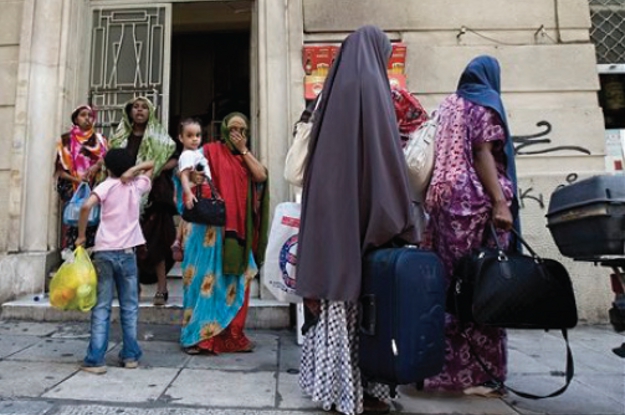If you get your views about what is happening globally from the mainstream international press, you could be forgiven for thinking that issues of migration fall into the context of the North-South power dichotomy in which so many global issues often tend to be framed.
If you are minded to seek out the truth, in the case of migration the dynamics are embedded in South-South relationships as well. In most parts of Ghana, where this author lives, the bogeyman of returned migrants’ tales of woe is not Italy, France or even the increasingly anti-migrant former colonial master, Britain. It is Libya.
If you take these tales seriously, Libya is where bastinado (whipping of the feet) is still the preferred disciplinary method of the anti-foreigner police, and detention for long stretches of time without right to counsel is commonplace. According to these Ghanaian travellers’ accounts, Libya is where sub-Saharan African migrants are framed for bogus charges so they can be relieved of their property and confined to inhuman dungeons before being repatriated back across the desert at the end of their unfair terms.
To readers outside West Africa, it will also come as a surprise that last year, when the concerns of Nigerian migrants were taken up by that country’s activist press, it was not Libya but Ghana that was cast as the most unwelcoming host country – next-door, compatriot Commonwealth neighbour, Ghana. But this is not an exceptional state of affairs, because Ghana and Nigeria had the dubious honour within the Commonwealth of having conducted the most massive tit-for-tat mass expulsions of each other’s migrants between the 1960s and 1980s. Historical resentments from that time still rankle.
A particular depth of feeling also attends migration issues in South Africa. Citizens of the African Commonwealth – particularly from Zimbabwe and Nigeria – usually feel the sharpest sting of the anti-foreigner sentiment that has flared periodically in that country, notwithstanding shared political histories and the common lingua franca.
Maybe Freud was right all along when he coined his phrase “narcissism in respect of least differences” as the source of sibling rivalry. He argued that it is a strong part of human behaviour to resent the traits reflected in another that appear to mirror our own most closely. Such resentments could, in part, be at the root of the South-South migration angst.
If you think about it, the trend of increasing migration within the Southern hemisphere is a highly natural process, as it is only to be expected that people will seek to move to places and into societies that resemble at least in some ways what they are leaving behind. When improvements in economic opportunity and social amenities can reasonably be expected, then most migrants would opt for a measure of familiarity and similarity in the key cultural and social structures.
Within any global region, the trend of people moving from low-income to neighbouring middle-income countries is, and will be, by far the most defining feature of international migration. However, recipient countries in the global South can struggle to define a philosophy to guide their seemingly urgent need to regulate migration.
Up to now, few of them have had to develop a political and legal metastructure in which to enmesh the social phenomena attributable to migration, as has happened in the global North. Many of the increasingly well-to-do countries in the global South are products of colonisation where the very notion of national borders had to be mechanically constructed as part of the trauma of state formation. And so the legal and historical caste systems of ‘citizen’ and ‘immigrant’ are hardly genuine products of national experience but, rather, contrivances for the management of the emergency logic of national security and territorial sovereignty.
Nowadays, migration management along borders in the global South is seen (especially by the migrants) as a clunky, poorly greased affair. The lamentations of a typical Indian migrant in the Gulf states or of a typical East Asian migrant in Singapore that the laws wherewith their lives are now to be governed seem blunt and even crudely non-responsive – must be understood in this framework.
If Ghanaian students in Malaysia who have had the chance to visit the UK on vacation argue that they find the former less welcoming than the latter – in direct contrast to their pre-travel expectations it is entirely because they are victims of a perception-moulding environment that sets too much store by tales of racism, xenophobia and neo-colonialism, without bothering to examine the subsidiary forces that actually combine to create these phenomena. Elements like anxiety, ineptness, ignorance, arrogance, power-distance and arbitrariness are capable of separate existence, as well as of recombination. Thus it is entirely possible for the rights of migrants to be severely abused even in societies where no organic culture of racism or xenophobia existed before.
In almost every respect, the safest bet for those who, within the Commonwealth and elsewhere, are eager to see conditions improve for migrants wherever they are, is to dissociate the struggle for migrants’ rights from the lumbering ideologies of the right and left and refocus their strengths and efforts on the humble but critical institutionalisation of free societies. The free movement of people, ideas, goods and services can become interrelated and interdependent on this score.
Institutional mechanisms can be consciously cultivated to promote open societies that are welcoming to ideas, goods and services from all parts of the world and, most importantly, to the people who bring them.






